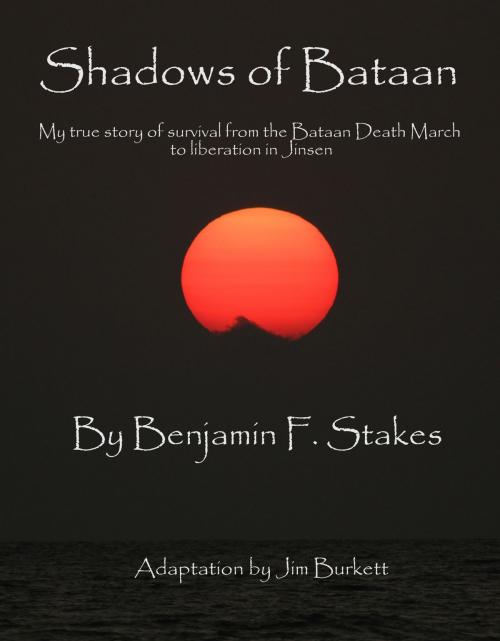| Author: | Benjamin F Stakes, Jim Burkett | ISBN: | 1230000202706 |
| Publisher: | inknbeans press | Publication: | December 13, 2013 |
| Imprint: | Language: | English |
| Author: | Benjamin F Stakes, Jim Burkett |
| ISBN: | 1230000202706 |
| Publisher: | inknbeans press |
| Publication: | December 13, 2013 |
| Imprint: | |
| Language: | English |
On April 10, 1942, Captain Benjamin F. Stakes was taken prisoner on Bataan. For the next three and a half years, he would serve as a POW detained within five different camps and treated, along with thousands of others, to the most horrific and inhumane conditions imaginable. Before his liberation in September of 1945, over forty thousand prisoners of war would perish at the hands of the Japanese.
This is a true story of survival. From his forced participation in what would later become known as the ‘Bataan Death March’ to the reuniting with family in 1946, the author secretly documented the most deplorable conditions of the camps, from the many diseases afflicting the men, to starvation, executions, and decapitation by the Japanese soldiers, along with the torture of American, Filipino, British and Australian prisoners that many were ultimately not able to endure. Knowing these recordings were done at great risk not only to himself but for his fellow officers and enlisted men as well, the documents were hidden in a jar by three American officers, with its location known only by memorizing the coordinates. Of the three, only Captain Benjamin F. Starks would survive and return to retrieve the contents. He would later forward the personal notes of one of the officers to his widow.
During his capture and transfer to the different POW camps, two of the ships transporting the men would be bombed and sunk by American planes. Describing a scene from one of the attacks where American medical officers tried helping the Japanese wounded, Mr. Stakes wrote: “As they went hurriedly about the task of rendering first aid, they were accompanied by a Jap officer who proceeded to shoot in the head any of his countrymen whose wounds appeared to be mortal, rather than let them suffer.”
On April 10, 1942, Captain Benjamin F. Stakes was taken prisoner on Bataan. For the next three and a half years, he would serve as a POW detained within five different camps and treated, along with thousands of others, to the most horrific and inhumane conditions imaginable. Before his liberation in September of 1945, over forty thousand prisoners of war would perish at the hands of the Japanese.
This is a true story of survival. From his forced participation in what would later become known as the ‘Bataan Death March’ to the reuniting with family in 1946, the author secretly documented the most deplorable conditions of the camps, from the many diseases afflicting the men, to starvation, executions, and decapitation by the Japanese soldiers, along with the torture of American, Filipino, British and Australian prisoners that many were ultimately not able to endure. Knowing these recordings were done at great risk not only to himself but for his fellow officers and enlisted men as well, the documents were hidden in a jar by three American officers, with its location known only by memorizing the coordinates. Of the three, only Captain Benjamin F. Starks would survive and return to retrieve the contents. He would later forward the personal notes of one of the officers to his widow.
During his capture and transfer to the different POW camps, two of the ships transporting the men would be bombed and sunk by American planes. Describing a scene from one of the attacks where American medical officers tried helping the Japanese wounded, Mr. Stakes wrote: “As they went hurriedly about the task of rendering first aid, they were accompanied by a Jap officer who proceeded to shoot in the head any of his countrymen whose wounds appeared to be mortal, rather than let them suffer.”















